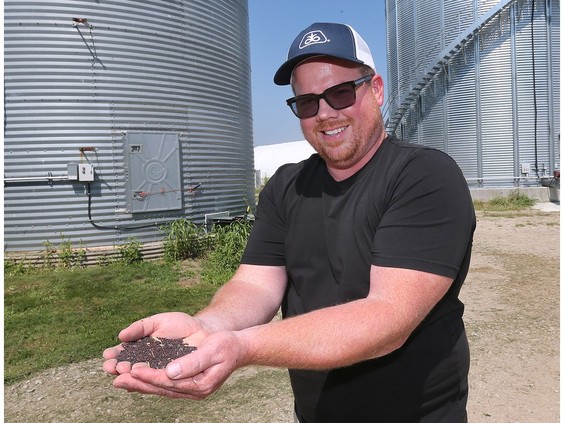World
China Imposes 75.8% Tariff on Canadian Canola, Farmers Concerned

China’s recent decision to impose a staggering 75.8 percent anti-dumping tariff on Canadian canola seed has raised significant concerns among farmers in Essex County, Ontario. While this region’s canola acreage is relatively small compared to western Canada, local agricultural leaders fear that the ripple effects of this tariff could disrupt their growing industry.
The new tariffs were announced last week, adding to existing trade penalties that have already affected Canadian canola exports to China. Ryan Koeslag, executive director of the Ontario Canola Growers, expressed deep concern over the impact of these tariffs on local farmers. “We actually had pretty good success with a new variety in Essex County, so it’s just peaking up,” he noted. “So certainly, when we have a 75.8 percent tariff from China, that’s essentially closing that market, which is our second-largest market for canola seed.”
Koeslag highlighted the efforts of local growers to expand winter canola production, collaborating with Archer Daniels Midland (ADM), a grain handling and oilseed processing facility based in Windsor. The aim was to scale up production to 50,000 acres. The potential for winter canola in the region was gaining traction, especially as local farmers adapt to the longer growing season and milder winters of southwestern Ontario.
Despite the optimism, the new tariffs could halt momentum. “It’s a pretty devastating blow right now,” Koeslag added. “We’re hoping that the government can move and negotiate and try and appease the Chinese.”
Currently, Ontario grows about 45,000 acres of canola, with only about 1,000 acres in Essex County. In contrast, western provinces cultivate over 22 million acres, supplying the majority of Canada’s canola exports to China. While local farmers have already harvested their canola by early July, Koeslag warned that the long-term effects of sustained tariffs could be detrimental. “It’s a national issue, so when we have these types of issues, it’s going to impact us in one way or the other,” he stated.
The tariff targets Canadian canola seed, a raw product that is typically crushed into oil and meal. China claims that the seed is being sold below fair market value, harming its domestic production. This latest tariff follows China’s earlier imposition of a 100 percent tariff on processed canola oil and meal earlier in the year.
For some local farmers, like Scott McLean of Scott and Dennis McLean Farms, the impact of these tariffs is less severe. McLean, who has been growing canola since 2019, indicated that canola is not his primary crop. “Canola isn’t my largest crop. Beans and corn are a larger portion of southwestern Ontario or Essex County growers’ crop rotation,” he explained. He noted that while he would prefer not to take a hit on the price of his canola seed, his operation could withstand the current market conditions if prices remain stable.
Yet, there is a shared consensus among local farmers that the uncertainty in the canola market could deter others from incorporating the crop into their rotations. McLean pointed to the rising costs of land, rent, and equipment as factors that make financial margins increasingly slim. “You don’t want to sign yourself up for an economic loss based on a tariff,” he cautioned.
Koeslag acknowledged that Essex County growers have been shielded from the immediate impact of the tariffs this season, unlike many Canadian producers entering their harvest. “It’s unfortunate timing for all of that 22 million acres of canola that’s being grown,” he concluded. “We’re just hoping for the best right now.”
As the situation evolves, the agricultural community in Essex County remains vigilant, hoping for a resolution that could restore access to the crucial Chinese market.
-

 Politics1 month ago
Politics1 month agoSecwepemc First Nation Seeks Aboriginal Title Over Kamloops Area
-

 World5 months ago
World5 months agoScientists Unearth Ancient Antarctic Ice to Unlock Climate Secrets
-

 Entertainment5 months ago
Entertainment5 months agoTrump and McCormick to Announce $70 Billion Energy Investments
-

 Lifestyle5 months ago
Lifestyle5 months agoTransLink Launches Food Truck Program to Boost Revenue in Vancouver
-

 Science5 months ago
Science5 months agoFour Astronauts Return to Earth After International Space Station Mission
-

 Lifestyle3 months ago
Lifestyle3 months agoManitoba’s Burger Champion Shines Again Amid Dining Innovations
-

 Technology3 months ago
Technology3 months agoApple Notes Enhances Functionality with Markdown Support in macOS 26
-

 Top Stories2 months ago
Top Stories2 months agoUrgent Update: Fatal Crash on Highway 99 Claims Life of Pitt Meadows Man
-

 Top Stories2 weeks ago
Top Stories2 weeks agoHomemade Houseboat ‘Neverlanding’ Captivates Lake Huron Voyagers
-

 Politics4 months ago
Politics4 months agoUkrainian Tennis Star Elina Svitolina Faces Death Threats Online
-

 Sports5 months ago
Sports5 months agoSearch Underway for Missing Hunter Amid Hokkaido Bear Emergency
-

 Politics5 months ago
Politics5 months agoCarney Engages First Nations Leaders at Development Law Summit





















